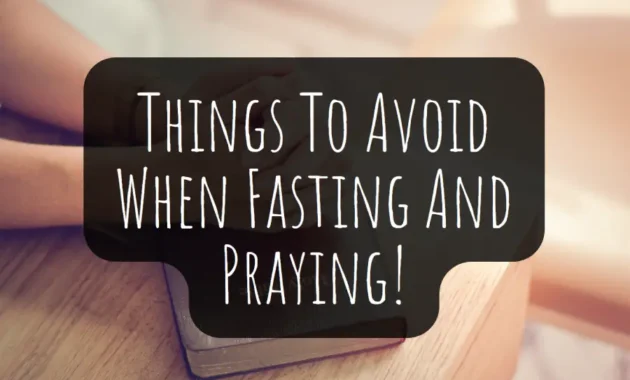16 Things To Avoid When Fasting And Praying
Fasting and praying are important spiritual practices that can help us grow in our faith and deepen our relationship with God.
During this time, it is crucial to focus our minds and hearts on godly things and avoid anything that can distract or hinder us from experiencing the fullness of God’s presence. In this regard, there are certain things that we should avoid when fasting and praying.
In the following sections, we will discuss some of these things in detail and why they can be detrimental to our spiritual growth during fasting and prayer.
See also: Prayers To Pray When Fasting
The Purpose of Fasting and Praying

The purpose of fasting and praying as a Christian is to seek God for direction, deliverance, repentance, seek a closer relationship with God, and intercede for others.
Fasting and praying is a spiritual discipline that involves denying oneself of food and sometimes other pleasures as a way of seeking God’s face. It’s a way of setting aside time to focus on God, to turn away from distractions and things that hinder our relationship with Him.
Things To Avoid When Fasting And Praying
1. Overindulging In TV and Social Media
During a period of fasting and prayer, it’s important to minimize distractions and focus on your spiritual growth. Spending excessive time watching TV or browsing social media can easily become a distraction, consuming precious time that should be spent in prayer and meditation.
Additionally, exposure to negative or worldly content can hinder your spiritual progress and lead to temptation. It’s best to limit your screen time during fasting and prayer, and instead focus on reading spiritual books, attending church services, and spending time in quiet reflection.
- Proverbs 4:25-27 – “Let your eyes look directly forward, and your gaze be straight before you. Ponder the path of your feet; then all your ways will be sure. Do not swerve to the right or to the left; turn your foot away from evil.”
2. Avoid Engaging In Sexual Activity
Abstain from any sexual related activities while fasting and praying. This ensures your thoughts are pure and focused on spiritual matters instead of fleshly desires. Withstanding temptation and being disciplined can lead to higher consciousness and spiritual growth.
It’s important to prioritize and stay committed during this time. Keeping a clear mind and resisting temptation can help you have a deeper spiritual experience.
- Colossians 3:5 – “Put to death therefore what is earthly in you: sexual immorality, impurity, passion, evil desire, and covetousness, which is idolatry.”
3. Avoid Gossip And Slander
When you’re fasting and praying, it’s important to keep your mind and heart focused on positive and uplifting thoughts. You cannot claim to be truly fasting and praying while engaging in gossip and slander.
These negative behaviors not only distract you from you from God’s presence but also harm others by spreading false information and damaging their reputation.
Instead, focus on speaking words of kindness, encouragement, and love. Use this time of fasting and prayer to cultivate a habit of speaking positively about others, and if you have an issue with someone, approach them directly and with compassion.
- Ephesians 4:29-32 – “Let no corrupting talk come out of your mouths, but only such as is good for building up, as fits the occasion, that it may give grace to those who hear. And do not grieve the Holy Spirit of God, by whom you were sealed for the day of redemption. Let all bitterness and wrath and anger and clamor and slander be put away from you, along with all malice. Be kind to one another, tenderhearted, forgiving one another, as God in Christ forgave you.”
4. Don’t Harbor Hatred
It’s important to let go of any hatred or resentment towards others when you’re fasting and praying. Holding onto negative emotions can hinder the effectiveness of your prayers. If you’re holding a grudge against someone, it’s important to forgive them genuinely from your heart, just as Jesus instructed us to do.
When you forgive, you release the burden of anger and bitterness, and you open yourself up to receive the blessings of fasting and prayer. So, if you want your fasting and prayer to be effective, make sure to let go of any bitterness and resentment towards others.
- Mark 11:25 – “And when ye stand praying, forgive, if ye have ought against any: that your Father also which is in heaven may forgive you your trespasses.”
5. Engaging In Impure Thoughts
When we engage in fasting and praying, it’s important to eliminate impure thoughts and desires from our minds. We are denying ourselves of self-gratification, and therefore, we should avoid things, places, or situations that may trigger sinful thoughts or desires to dwell in our hearts.
Our hearts should be consecrated to God in order to hear from Him, but God will not draw near to a heart that is filled with impurities because He is a holy God.
Therefore, it is necessary to totally avoid impure thoughts and desires when fasting and praying in order to fully benefit from this spiritual practice. By doing so, we open ourselves up to God’s presence and guidance, and allow ourselves to grow closer to Him.
- 2 Timothy 2:22 – Flee also youthful lusts: but follow righteousness, faith, charity, peace, with them that call on the Lord out of a pure heart.
6. Don’t Pray Amiss
When you’re fasting and praying, it’s important to have a clear understanding of what you’re praying for and how to pray. Don’t pray amiss or without a purpose. Make sure your prayers are aligned with God’s will and in accordance with His word. Pray for guidance, wisdom, and discernment to know what to pray for and how to pray.
Remember, prayer is not just about asking for things but also about building a relationship with God and seeking His will for your life.
So, take the time to listen and wait for His leading, and pray in faith knowing that God is able to do more than we could ever ask or imagine.
- 1 John 5:14-15 – “And this is the confidence that we have toward him, that if we ask anything according to his will he hears us. And if we know that he hears us in whatever we ask, we know that we have the requests that we have asked of him.”
7. Dishonest Behaviours
Dishonest Behaviours: Fasting and praying is not just about abstaining from food, it’s also about developing a deeper relationship with God. It’s a time to examine ourselves and our behaviors. Dishonesty is not acceptable when we’re seeking to connect with God on a deeper level.
We should avoid any form of dishonest behavior, such as lying, cheating, stealing, or any other actions that go against God’s commandments. Instead, we should strive to live honestly and with integrity, reflecting the character of Christ in all that we do.
When we’re fasting and praying, it’s important to be honest not just with others, but also with ourselves and with God.
- Luke 16:10-12 – “One who is faithful in a very little is also faithful in much, and one who is dishonest in a very little is also dishonest in much. If then you have not been faithful in the unrighteous wealth, who will entrust to you the true riches? And if you have not been faithful in that which is another’s, who will give you that which is your own?”
8. Eating Too Much
One of the main purposes of fasting is to deny oneself food in order to focus on prayer and spiritual reflection. However, some people may be tempted to eat too much during non-fasting periods, as a way of compensating for the time when they were not allowed to eat.
This defeats the purpose of fasting, as it is meant to be a time of self-control and discipline. Overeating can also lead to physical discomfort and distract from the spiritual experience of fasting and praying.
It’s important to eat in moderation during non-fasting periods and not use food as a way to compensate for the sacrifice made during fasting.
- 1 Corinthians 10:31 – “So, whether you eat or drink, or whatever you do, do all to the glory of God.”
9. Excessive Exercise
Excessive exercise during fasting and prayer can be harmful to your health and counterproductive to your spiritual goals. While light to moderate exercise is acceptable, intense workouts or long runs can lead to exhaustion and dehydration, making it difficult to focus on prayer and meditation.
It’s important to listen to your body and not push yourself beyond your limits during fasting and prayer. Instead, focus on gentle exercises like walking or light aerobic to help calm the mind and nourish the body.
- 1 Timothy 4:8 – “For while bodily training is of some value, godliness is of value in every way, as it holds promise for the present life and also for the life to come.”

10. Holding Grudges
During fasting and praying, it’s important to let go of any grudges or unforgiveness in your heart. Holding onto grudges can block the flow of God’s blessings and hinder your prayers from being effective.
As a believer, it’s important to follow the example of Jesus and forgive those who have wronged us, no matter how difficult it may be.
Letting go of grudges not only benefits our spiritual life but also our mental and emotional well-being.
- Romans 12:17-21 – “Repay no one evil for evil, but give thought to do what is honorable in the sight of all. If possible, so far as it depends on you, live peaceably with all. Beloved, never avenge yourselves, but leave it to the wrath of God, for it is written, “Vengeance is mine, I will repay, says the Lord.” To the contrary, “if your enemy is hungry, feed him; if he is thirsty, give him something to drink; for by so doing you will heap burning coals on his head.” Do not be overcome by evil, but overcome evil with good.”
11. Don’t Be Distracted By Time
When engaging in fasting and praying, it’s important to remember that the focus is not on the length of time you’re fasting or praying but on the spiritual growth and connection with God.
Don’t be too focused on the clock or on when your fasting period will end, as this can be a distraction from the true purpose of fasting and praying. Instead, focus on being present in the moment and seeking God’s guidance and wisdom.
Remember that fasting and praying is a spiritual journey, not just a physical one.
- Romans 13:11 – “Besides this you know the time, that the hour has come for you to wake from sleep. For salvation is nearer to us now than when we first believed.”
12. Don’t Forget To Pray First
It’s important to remember that fasting without prayer is just a diet. Before embarking on a fasting journey, start with prayer and ask God to guide you and give you the strength to complete the fast. This will also help you to stay focused on the purpose of the fast, rather than just the physical act of not eating. So, don’t forget to pray first before you start your fast.
- Matthew 26:40-41 – “Then he returned to his disciples and found them sleeping. “Couldn’t you men keep watch with me for one hour?” he asked Peter. “Watch and pray so that you will not fall into temptation. The spirit is willing, but the flesh is weak.””
13. Don’t Forget To Study The Bible
Fasting and praying should not only be about denying oneself physical needs, but it should also be a time to draw closer to God through studying His word. The Bible is God’s revealed word to mankind and it contains wisdom, knowledge, and instruction that we need to live a successful and fulfilling life.
It’s important to set aside time during the fast to read and meditate on the Bible, seeking to understand its message and apply it to our lives. This will help us to stay focused on God and His will during the fast and beyond.
- 2 Timothy 3:16-17 – “All Scripture is breathed out by God and profitable for teaching, for reproof, for correction, and for training in righteousness, that the man of God may be complete, equipped for every good work.”
14. Avoid Ungodly Chatter
During fasting and prayer, it’s important to avoid engaging in ungodly chatter or conversations that are not edifying. This includes gossip, inappropriate jokes, and negative talk. Instead, focus on conversations that build up and encourage others, and that honor God.
Remember that our words have power, and we should use them wisely, especially during times of spiritual discipline like fasting and prayer.
- Ephesians 5:4 – “Let there be no filthiness nor foolish talk nor crude joking, which are out of place, but instead let there be thanksgiving.”
15. Don’t Be Like The Hypocrites
When fasting and praying, it’s important to remember not to be like the hypocrites. In Matthew 6:16-18, Jesus warned against practicing spiritual disciplines like fasting to be seen by others. He said that if we do, then we have already received our reward in the form of human praise, rather than receiving a reward from God.
Therefore, it’s important to fast and pray with a pure heart and the right intentions. It’s not about showing off to others or gaining recognition for our spiritual discipline. Instead, it’s about seeking God and growing closer to Him. When we fast and pray in this manner, God sees and rewards us accordingly.
- Matthew 6:16-18 – “When you fast, do not look somber as the hypocrites do, for they disfigure their faces to show others they are fasting. Truly I tell you, they have received their reward in full. But when you fast, put oil on your head and wash your face, so that it will not be obvious to others that you are fasting, but only to your Father, who is unseen; and your Father, who sees what is done in secret, will reward you.”
16. Avoid Vulgarity And Garrulousness
During prayer and fasting, it’s important to watch our words and speech. We should refrain from using vulgar language or engaging in excessive talking or gossip.
Our speech should be pure and uplifting, reflecting the love and grace of God. We should also strive to use our words to encourage and edify others, rather than tearing them down.
- Ephesians 4:29 – “Let no unwholesome word proceed from your mouth, but only such a word as is good for edification according to the need of the moment, so that it will give grace to those who hear.”
Frequently Asked Questions
1. What are the top things to avoid when fasting and praying?
A: Some of the things to avoid when fasting and praying include junk food, stimulants such as caffeine and nicotine, negative thoughts and emotions, excessive social media and television, unnecessary conversation, and an overemphasis on physical activity.
2. Can I drink water during my fast?
A: Yes, drinking water is important when fasting. It helps keep the body hydrated, removes toxins, and maintains normal body functions.
3. Can I take medication while fasting?
A: If you have a medical condition that requires medication, it is advisable to take it during your fast. However, always consult with your doctor prior to commencing a fast.
4. How long should I fast and pray for?
A: God does not look at how long you have fasted and prayed but rather at the sincerity and intention behind your actions. It is important to approach fasting and praying with a humble and open heart, seeking to deepen your relationship with God and align your will with His.
5. Can I break my fast if I feel weak or dizzy?
A: It’s important to listen to your body during a fast. If you feel weak or dizzy, breaking your fast is advisable. Drink water or eat a small meal to help restore your energy.
6. What are the spiritual benefits of fasting and praying?
A: One of the key spiritual blessings of fasting and praying is that you are drawn more and more closer to God and aligning your heart with His purposes.






